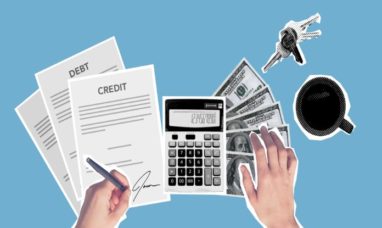A mortgage is a written contract that gives the lender the right to take your home back if you don’t pay back the money you borrowed as agreed. Your mortgage payment is spread out over a certain number of years based on how much you borrowed and what your interest rate is.
Customers often choose 30-year fixed-rate mortgages because they have the most stable payment over the life of the loan and the lowest monthly payment. Borrowers can also choose an adjustable-rate mortgage (ARM) for short-term savings over three to ten years, but the interest rate usually changes every year after that.
What You Should Know About Home Loans
Credit score
Some home loan programs will let you apply with a score of 500, but a score of 620 will get you lower mortgage rates and a smaller down payment. Get a free credit report to see where you stand, and then Put in the utmost effort to improve your credit rating before you apply for a mortgage.
Affordability of housing
You should only buy a home in that price range if you qualify for a certain amount of a mortgage loan. Select a purchase price and monthly mortgage payment that will allow you to save for other financial objectives, such as retirement and emergency savings.
Down payment
Some mortgage programs let you put down as little as 3%, and some borrowers can put nothing down. If you haven’t saved any money, you can get help with the down payment or a gift from a friend or family member.
Interest rate
Your interest rate is based on more than just your credit score. It also depends on your down payment, loan amount, loan type, and where your home is located. Your rate will also be determined by the kind of home you buy (single-family versus manufactured) and whether you intend to live in or rent out the house.
Programs for mortgage loans
If your credit score is less than 620, you could qualify for an FHA loan. If you are in the military and don’t have a down payment, you may wish to apply for a VA loan.
10 Steps to Getting a Mortgage
-
- Check how your money is doing. Ask Equifax, Experian, and TransUnion, three big credit reporting agencies, for a copy of your credit report. Use a home affordability calculator to see how much you might qualify for.
- Choose a mortgage that fits your needs. Do you need to pay attention to a mortgage with a low down payment? Do you want to avoid mortgage insurance by making a 20% down payment? You can choose the best mortgage for your needs if you know what your real estate and money goals are.
- Find out how long your loan will last. Most people choose a 30-year fixed-rate loan because it has the lowest monthly payment. If you can pay more each month, you might save thousands of dollars with a 15-year fixed loan.
- Continue to save, save, save. You’ll also need money for closing costs, which can be anywhere from 2% to 6% of the loan. Increase your emergency fund to cover unexpected repair and maintenance expenses. If you have a medical emergency or lose your job, your lender may want you to have money saved up so you can keep paying your mortgage.
- Shopping, shopping, and more shopping. Research from LendingTree shows that when borrowers compare mortgage rates from at least three to five lenders, they save money. When comparing rate and fee quotes, give each lender the same information so you can compare apples to apples.
- Get pre-approvedpre-approved for a mortgage before starting shopping for a home. A pre-approval letter says that you can get a mortgage loan and that you can look for homes in a certain price range. If you’ve been pre-approvedpre-approved, home sellers are more likely to take you seriously as a buyer.
- Make an offer on the house you want. Once you’ve found the perfect place, make your best offer and include a copy of your pre-approval letter. If your offer is accepted, you will put down the required deposit to show that you are serious about the deal.
- Plan an inspection of the home. After accepting your offer, schedule a home inspection to identify any needed repairs or major issues. After you negotiate repairs with the seller, your lender will usually order a home appraisal to discover how much the home is worth on the market.
- Working with the underwriter is a good idea. Your lender’s underwriting team will ask for paperwork to check the information on your loan application. Respond as soon as you can to keep things moving along. Once you have received final loan approval, you will receive a closing disclosure (CD) at least three business days before your closing date. It will show the total costs of the transaction, including the money that needs to be brought to the closing table.
- Complete the final walkthrough and closing. Before you go to the mortgage closing, you should walk through the house to make sure that all repairs have been made and that it is ready for you. At the closing, you’ll pay your down payment and closing costs and get the keys to your new home.
Choose the Best Mortgage for You
Traditional loans
Mortgages that are not insured by the government but follow the rules set by Fannie Mae and Freddie Mac. You can get a traditional mortgage loan with just 3% down, but your credit score needs to be at least 620 to qualify.
FHA mortgages
The Federal Housing Administration backs loans for homes that are made by lenders who are approved by the FHA. You can get an FHA loan with only 3.5% down if your credit score is 580 or higher. If your score ranges from 500 to 579, you must deposit 10%. FHA loans require both a one-time mortgage insurance premium and an annual premium, which are usually paid for the life of the loan.
Veterans Administration Loans
Qualified military borrowers can get mortgages backed by the Department of Veterans Affairs (VA) of the United States. You don’t have to make a down payment to get mortgage insurance with VA loans, but you do need a VA certificate of eligibility to get one.
How to Look for a Home Loan
After choosing a loan program, you can start looking for lenders. The mortgage rates of local banks, lenders, online lenders, and credit unions are compared. Ask your family, your friends, and your real estate agent for suggestions. If you use a website that compares rates, lenders will contact you with competing offers, saving you time and work. A mortgage broker can also do the shopping for you. Once you have the contact information for three to five lenders, follow the four steps below to shop around:
-
- Request price quotes on the same day.
- Ask each lender the same questions, like “How long is the rate quote good for?” How much will it cost to start? Is the interest rate fixed, or can it go up or down? How much does the APR (annual percentage rate) cost?
- After you send in your mortgage application, you should get loan estimates from each lender within three business days.
- Save the estimates so you can compare prices and fees before making a final decision.
How to Get a Mortgage Loan
Credit score. For a conventional loan, you need a credit score of 620, but for an FHA loan with a 3.5% down payment, you only need a score of 580. The minimum credit score that VA and USDA lenders may ask for is 620 and 640, respectively.
Debt-to-income (DTI) ratio. To get your DTI ratio, divide your total monthly debt payments by your gross monthly income. A DTI ratio of 43% or less is what lenders recommend. You can get a mortgage with a DTI ratio as high as 50% if you have good credit and/or a bigger down payment.
Down payment. With a 3% down payment, you can get a conventional loan (income limits may apply). For an FHA loan, you need to put down at least 3.5%. If you qualify for a USDA or VA loan, you might not have to make a down payment.
Working experience. Lenders want to see evidence of steady work and income over the past two years. Prepare pay stubs, W-2 forms, and federal tax returns for your lender.
Featured Image: Unsplash © Tierra Mallorca







